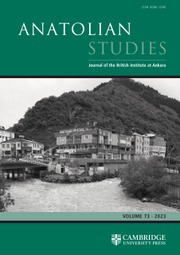No CrossRef data available.
Article contents
Who were the Lelegians? Interrogating affiliations, boundaries and difference in ancient Caria
Published online by Cambridge University Press: 16 May 2023
Abstract
Who were the Lelegians? Ancient Greek and Latin texts refer to the Lelegians as an indigenous people, locating them in southwestern Anatolia in a region known in historical times as Caria. Yet attempts to find evidence for the Lelegians ‘on the ground’ have met with questionable success. This paper has two aims. First, it provides an up-to-date picture of the archaeology of ancient Caria and shows that there is little indication of distinctly ‘Lelegian’ forms of material culture during the first millennium BCE. Second, it juxtaposes archaeological evidence with the development of the Lelegian ethnonym and suggests that the idea of a distinct Lelegian identity was retrospectively constructed by the Carians to fulfil the role of an imaginary ‘barbarian other’. This happened in the late Classical and early Hellenistic periods, a time of intensified Carian ethnogenesis, and was a process that responded to and made creative use of earlier Greek knowledge traditions. Finally, this paper argues that a later horizon of Lelegian imagining occurred in modern scholarship of the 19th and 20th centuries. Who, then, were the Lelegians? This article proposes that they were an imaginary people, invented and reinvented over the centuries.
Özet
Lelegler kimdi? Eski Yunanca ve Latince metinler, Leleglerden yerli bir halk olarak söz eder ve onları, güneybatı Anadolu’da tarihsel dönemlerde Karia olarak bilinen bir bölgede konumlandırır. Yine de Lelegler için ‘sahada’ kanıt bulma girişimleri tartışmaya açık bir başarıyla sonuçlanmıştır. Bu makalenin iki amacı bulunmaktadır. İlki antik Karia arkeolojisinin güncel bir resmini sunmak ve MÖ birinci binyılda belirgin bir şekilde “Leleg”lerle ilgili materyal kültür form-larına dair çok az kanıt olduğunu göstermektir. İkinci amacı ise, arkeolojik kanıtları Leleg etnik isminin gelişimiyle birlikte değerlendirerek, farklı bir Leleg kimliği fikrinin geriye dönük olarak Karialılar tarafından “öteki barbarlar” rolünü yerine getirmek için yaratılan hayali bir topluluk olduğunu ileri sürmektir. Bu, Karia etnik kökeninin yoğunlaştığı bir dönem olan geç Klasik ve erken Hellenistik dönemlerde meydana gelmiş ve daha önceki Yunan bilgi geleneklerine karşılık gelen ve onları yaratıcı bir şekilde kullanan bir süreç olmuştur. Son olarak, bu çalışmada, 19. ve 20. yüzyılların modern biliminde Leleg tasavvurunun daha geç bir anlayış biçimi tartışılmaktadır. O halde Lelegler kimdi? Bu makalede, onların yüzyıllar boyunca yaratılan ve yeniden keşfedilen hayali bir halk oldukları öne sürülmektedir.
- Type
- Research Article
- Information
- Creative Commons
- This is an Open Access article, distributed under the terms of the Creative Commons Attribution-NonCommercial licence (https://creativecommons.org/licenses/by-nc/4.0/), which permits non-commercial re-use, distribution, and reproduction in any medium, provided the original work is properly cited. The written permission of Cambridge University Press must be obtained for commercial re-use.
- Copyright
- © The Author(s), 2023. Published by Cambridge University Press on behalf of the British Institute at Ankara


